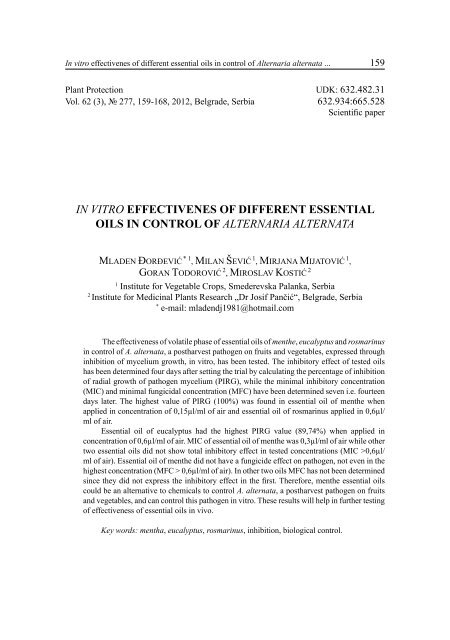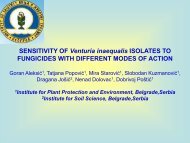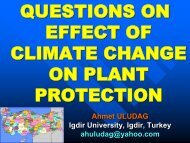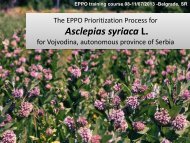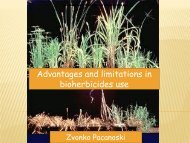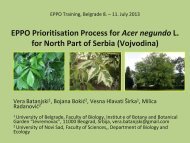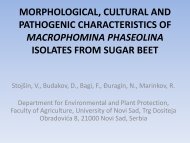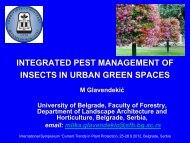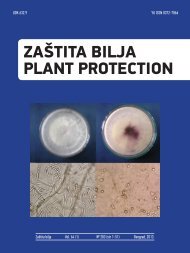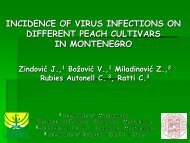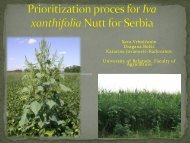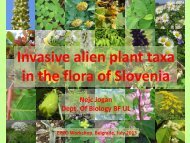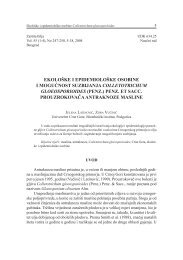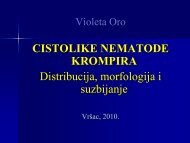ZAŠTITA BILJA PLANT PROTECTION
Vol.62 (3) - Izbis
Vol.62 (3) - Izbis
Create successful ePaper yourself
Turn your PDF publications into a flip-book with our unique Google optimized e-Paper software.
In vitro effectivenes of different essential oils in control of Alternaria alternata ... 159<br />
Plant Protection UDK: 632.482.31<br />
Vol. 62 (3), № 277, 159-168, 2012, Belgrade, Serbia 632.934:665.528<br />
Scientific paper<br />
IN VITRO EFFECTIVENES OF DIFFERENT ESSENTIAL<br />
OILS IN CONTROL OF Alternaria alternata<br />
MLADEN ĐORĐEVIĆ * 1 , MILAN ŠEVIĆ 1 , MIRJANA MIJATOVIĆ 1 ,<br />
GORAN TODOROVIĆ 2 , MIROSLAV KOSTIĆ 2<br />
1<br />
Institute for Vegetable Crops, Smederevska Palanka, Serbia<br />
2<br />
Institute for Medicinal Plants Research „Dr Josif Pančić“, Belgrade, Serbia<br />
*<br />
e-mail: mladendj1981@hotmail.com<br />
The effectiveness of volatile phase of essential oils of menthe, eucalyptus and rosmarinus<br />
in control of A. alternata, a postharvest pathogen on fruits and vegetables, expressed through<br />
inhibition of mycelium growth, in vitro, has been tested. The inhibitory effect of tested oils<br />
has been determined four days after setting the trial by calculating the percentage of inhibition<br />
of radial growth of pathogen mycelium (PIRG), while the minimal inhibitory concentration<br />
(MIC) and minimal fungicidal concentration (MFC) have been determined seven i.e. fourteen<br />
days later. The highest value of PIRG (100%) was found in essential oil of menthe when<br />
applied in concentration of 0,15µl/ml of air and essential oil of rosmarinus applied in 0,6µl/<br />
ml of air.<br />
Essential oil of eucalyptus had the highest PIRG value (89,74%) when applied in<br />
concentration of 0,6µl/ml of air. MIC of essential oil of menthe was 0,3µl/ml of air while other<br />
two essential oils did not show total inhibitory effect in tested concentrations (MIC >0,6µl/<br />
ml of air). Essential oil of menthe did not have a fungicide effect on pathogen, not even in the<br />
highest concentration (MFC > 0,6µl/ml of air). In other two oils MFC has not been determined<br />
since they did not express the inhibitory effect in the first. Therefore, menthe essential oils<br />
could be an alternative to chemicals to control A. alternata, a postharvest pathogen on fruits<br />
and vegetables, and can control this pathogen in vitro. These results will help in further testing<br />
of effectiveness of essential oils in vivo.<br />
Key words: mentha, eucalyptus, rosmarinus, inhibition, biological control.


